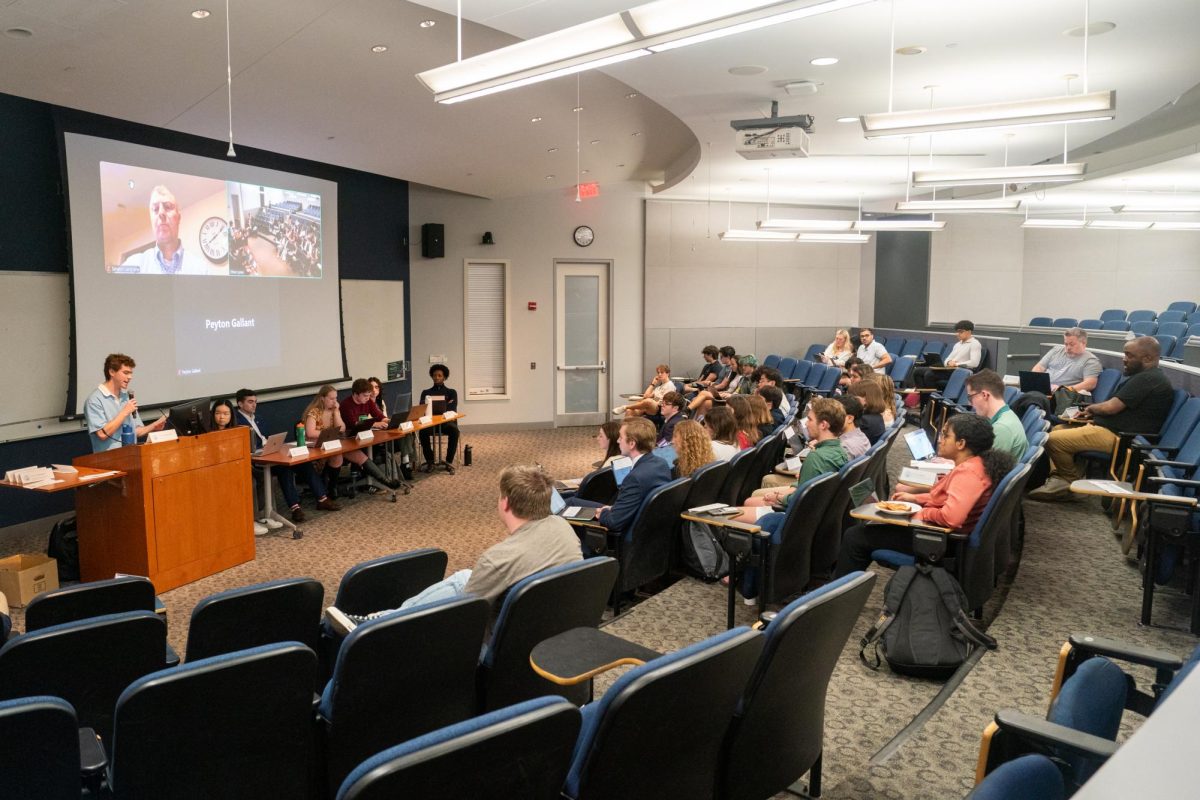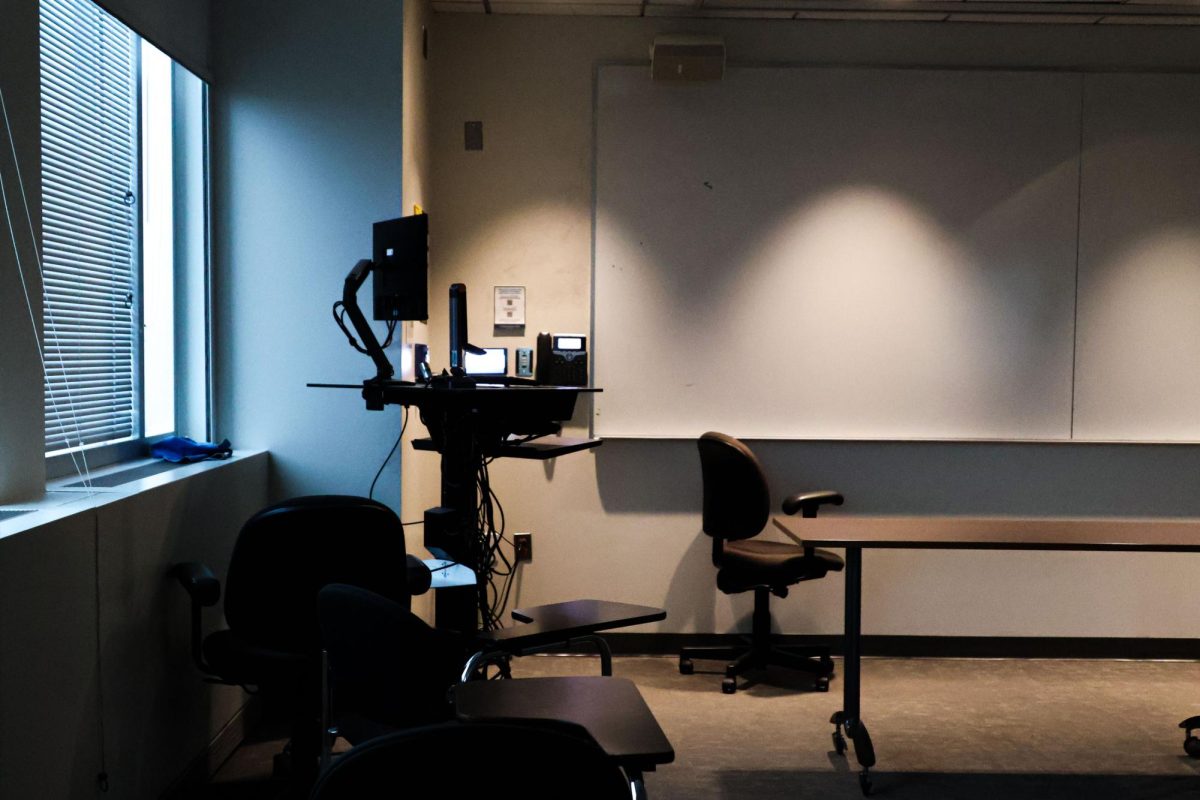The Student Court dismissed a case filed by students against the Student Government Association for their alleged “inaction” during campus protests last spring at a public court meeting Sunday.
The plaintiffs — the GW Humanitarian Mapping Society and students Israel Cesar Porrata Salgado, Will O’Connel and Lily Vanderlaan — filed a complaint with the Student Court on May 5 against the SGA, SGA President Ethan Fitzgerald and SGA Vice President Ethan Lynne for not advocating for students during campus protests, which they said violated the SGA charter. Matthew DeBellis, who serves as the court’s chief justice, said the court dismissed the case because of the plaintiff’s “failure” to submit the necessary briefing documents.
“The plaintiffs’ inability to comply with submission deadlines, even with a continuance granted, has hindered the Court’s ability to proceed with a substantive evaluation of the issues presented,” DeBellis said at Sunday’s virtual court meeting.
DeBellis said the court recognized O’Connell as the primary plaintiff because the other students named in the case did not respond to emails from the court over the summer and at the start of the academic year. None of the plaintiffs or defendants attended Sunday’s meeting.
O’Connell’s complaint, which he and the other students filed on May 5, argued that the SGA’s alleged “deliberate inaction” during the pro-Palestinian encampment in University Yard last spring violated article three of the body’s charter, which outlines the SGA’s responsibility to protect the rights outlined in GW’s Statement on Student Rights and Responsibilities. O’Connell said the SGA should have “formally addressed” the University’s violations of students’ rights to demonstrate during the encampment and advocated for the protection of their free speech and expression.
The SGA passed a resolution and issued an Instagram statement on May 6, the 12th day of the encampment, criticizing officials’ condemnation of the pro-Palestinian demonstration. SGA senators passed an additional resolution after the Metropolitan Police Department cleared the encampment and arrested 33 protesters, calling out GW for supporting MPD’s use of “excessive force” against campus protesters.
The Washington Post reported on April 26 that GW asked MPD to clear the encampment. In an interview last month, University President Ellen Granberg said to her “knowledge” no officials requested that officers clear the encampment.
The court issued an order on May 8 requesting briefs from the plaintiffs and defendants by May 17 so that the court could answer questions about the case’s legitimacy following the SGA Senate’s resolutions, and determine if the case was “political” in nature — which would prevent the court from ruling on the matter, according to the SGA’s constitution. DeBellis said the defendants submitted the necessary documents, but the plaintiffs failed to submit briefs despite the court granting them multiple extensions.
Coughlin said the defendants also submitted evidence in their brief that did not comply with the court’s bylaws, as it included students’ personal GWID numbers and screenshots from text message conversations.
“Presenting evidence to any court carries a high burden of proof,” Coughlin said. “Insofar as to say, text messages, a form of media which is typically a place of informal communications, may lead any panel of judges to question, one, the intention of this evidence, and two, whether the counselors are acting in good faith.”
Associate Judges Jasper Coughlin and Francheska Salazar read concurring opinion documents to address “misconduct” from both the plaintiffs and the defendants during the case, due to both sides’ alleged failure to adhere to the court’s bylaws and procedures.
The defendants submitted a motion on May 7 asking DeBellis to recuse himself from the case because of “personal connections” to O’Connell. Alexia Colella and Deepthi Sathyanarayana, who serve on the SGA Senate’s legal council, submitted screenshots of O’Connell and DeBellis working together on Aly McCormick’s campaign for vice president last April.
The court denied the defendants’ motion for recusal because of “insufficient” evidence to prove DeBellis’ relation to O’Connell in a capacity that would deem him an impartial justice in the case. Associate Justice Juan Carlos Mora wrote a “memorandum opinion” outlining the court’s reasoning for declining the defendant’s motion for recusal.
“The Defendant establishes that a relationship exists but stops short of explaining, as required by the “reasonableness” standard, why this relationship could plausibly render the chief justice unable to consider or decide the central dispute of this case,” Mora wrote.
Salazar said she hopes in future cases heard by the court, students will uphold the rules outlined by the court for submitting briefs and following correct procedures so they can accurately represent the student body.
“Parties must ensure that they follow the court rules of procedure and uphold the integrity of not only the court procedures, but GW values,” Salazar said. “The actions displayed in this case fall short of the expectations of decorum and civility that the student body rightfully demands.”





